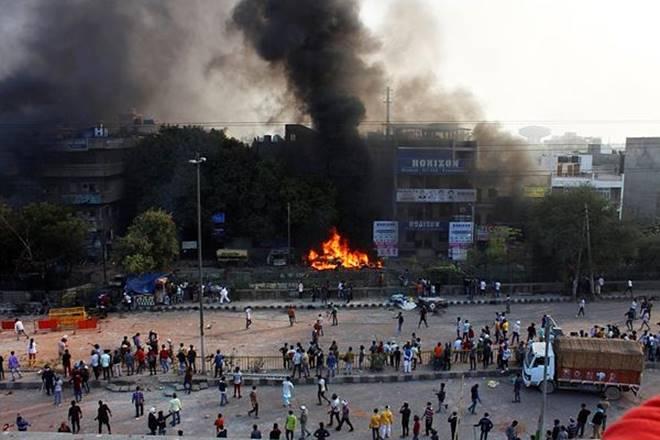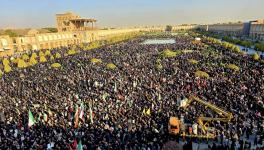Delhi Burns, Rekindling Memories of 1984

The unedifying sight of National Security Advisor (NSA) Ajit Doval walking the streets of North-East Delhi is a reminder that in the capital city of India, where Police is directly controlled by the Union Home Ministry, the police machinery collapsed or was made to fold up. In the process, the glamour and glitz associated with the President of the United States’ visit to India could not save the public relations event from losing its sheen. All because Hindutva footsoldiers descended to wreck havoc, unconcerned by the importance attached to Donald Trump’s visit by their leaders. Once begun, it turned into mobs battling each other because authorities looked the other way.
That the NSA, tasked with external and internal security, had to be brought in, also means that the “strong” government is incapable of handling law and order, thus raising concerns on whether they can be trusted with handling anything above its threshold. There was no Section 144 imposed for four days when the same is deployed by the Delhi Police at the ‘drop of a hat’ to prevent political dissidents and citizen protestors from coming out in public. There were no flag marches for nearly 96 hours. There was no shoot-at-sight order. Indeed the Standard Operating Procedure to handle such situations was visible nowhere. This points towards the police’s complicity, through acts of omission and commission, in allowing the situation to deteriorate and turn a matter of law and order to reach the threshold of internal security.
For four days now, Delhi’s North-East areas comprising Maujpur, Jaffarabad, Gokulpuri, Bhajanpura and other suburbs burned while police was inadequately deployed or not present at all. As I sit down to write this, thirty-four people were killed (numbers are expected to rise) and more than 300 have been injured; a mosque and a mazar were destroyed, property and residences looted and burnt. Like the 1984 anti-Sikh carnage, Delhi police either stood by or facilitated anti-Muslim mobsters.
This situation was in the making since the recent Delhi Assembly elections when the Bhartiya Janata Party (BJP) unleashed the most vicious campaign that Delhi had ever seen. Even before elections in Delhi, the role of the police in attacking students other than ABVP wallahs was there for all to behold. For such a brazenly partisan role, the Prime Minister and the Home Minister (HM) showered fulsome praise on the Delhi Police.
While this is not surprising because of the Delhi Police’s role in attacking students at Jamia Milia Islamia or in Jawaharlal Nehru University, where they switched off the street lights at JNU’s main gate to allow armed goons of ABVP to enter the campus and then leave without fear of arrest. They also let inebriated men enter Gargi Girls College during their college fest to molest and harass girl students. These incidents are well recorded and much talked about. What is not, is how the Delhi Police singles out minorities, Hindus who are opposed to Hindutva, and how they hurt and injure those besieged while treating mobsters with kid gloves.
Whether four days of arson, loot and killing let loose by mobsters was part of a deliberate plan for the defeated BJP politicians to punish Delhiites for voting for the Aam Aadmi Party (AAP), or enacting an Uttar Pradesh-like organised attack on minorities for daring to protest and assert their rights, the police has ceased to be a force which inspires confidence that they are there for every citizen. And this is the reality citizens confront today.
Retired and serving Police officers have often pointed out that any riot-like situation can be brought under control within 24 hours. And that if it continues beyond that, it indicates either complicity at the command level or because the force has turned incompetent. But truth is that a part of the capital city of Delhi was allowed to burn for more than 96 hours reviving bitter memories of the 1984 anti-Sikh carnage.
For sure, not every police personnel is a ‘rotten apple’. There are examples of police personnel coming to the aid of beleaguered citizens. But what we witness at large is how the ‘rotten’ seem to dominate the force and call the shots. For sure, even such a force if ordered to prevent arson and killing, is capable of putting a stop to it. The question is why no orders were issued by the Home Ministry?
So, Delhi’s biggest problem is that it is run by the Union Home Ministry, and going by what is happening it is clear that, either by design or through gross ineptitude, the HM displayed a poor grasp of his Constitutional responsibility through gross ignorance of law which amounts to mis-governance. It is galling, therefore, to hear potentates remind citizens of their “duties” when they lack the courage and commitment to remind people in authority of their responsibility to protect Constitutional values, especially the life and liberty of every citizen.
Therefore, when the HM appealed to the people to not to make “unnecessary and unwarranted criticism” of the police because this “will demoralise the police force” or when the Solicitor General (SG) asked the apex court to not pass an adverse comment on the Delhi police as it will “demoralise” the police force, it became clear that such advice was directed at cocooning a police force whose bias and prejudicial conduct has demoralised and let down citizens of Delhi.
Neither the HM nor the SG expressed even an iota of concern over demoralisation of citizens.
It is also remarkable how expeditiously the Delhi Police witch-hunts dissidents and goes after students, girls and boys, in sharp contrast to how they become dysfunctional when compelled to go after Hindutva mobsters. It has taken them more than two months, for instance, and they continue to procrastinate over chasing the goons involved in JNU attack, some of whose identities are known. Consider also how generous they were to molesters of Gargi girls college – who got bail – despite the complaint of sexual molestation and harassment against them.
What is startling is the sight of Hindutva mobsters moving unencumbered when their party-led central government was hosting the US President. Its as though the visit of Donald Trump provided a perfect backdrop for the organised mob to have its way. Was it spontaneous as Amit Shah claimed, or instigated as his Minister of State claimed? Either way, where was the intelligence input? Or is this lack of intelligence because the brief given to enforcers of law is to not report on plans and activities of Hindutvawadis and, therefore, they remained unaware of what was in the making?
When the police behaves as a lawless force or a partisan force then the question to ask is what should a citizen do? Who should he/she turn to for help and assistance? If no FIR of the aggrieved people can be recorded but any complain, however fanciful, lodged by a Hindutvawadi gets recorded, what do we do? Especially when the AAP government was found wanting in even asking their volunteers and MLAs to undertake confidence building measures in troubled parts of NE Delhi.
So the question which troubles most of us today is: Who do we turn to for aid? This predicament was faced by concerned citizens in 1984 too. If institutions mandated to protect life and liberty can not be trusted to uphold the Constitution, then we are creating a situation where people will turn their back on the established norms and start exploring other alternatives. This could well be a repeat of what Delhi faced after the 1984 carnage.
Consequently, to carry on believing that things will work out no matter what is a luxury we no longer enjoy. If a mob can enter homes or people can be fired at from rooftops or face stones thrown, combined with the apprehension that Police will side with the perpetrators, then merely talking to each one to maintain peace will not do. The four days that shook Delhi are a reminder that unless people show their resentment and anger against the role of police and the BJP government there will be no turning back for those who feel helpless, insecure and fear that their very existence is threatened. If helplessness is what Hindutvawadis want to promote so that some of the aggrieved are driven to take to violence, then we are entering a phase where conflict will escalate.
There is a lesson for the BJP government too if they care to learn. It is easy to mount the tiger of communal hatred, but more difficult to dismount the same. So while they have promoted hate mongers to spew venom and spread it widely, the same elements turned around to rob the government from staging a propaganda coup through the US President’s pomp and show visit. So the choice is theirs to make, whether they will crack down on their Hindutva cohorts who enjoy impunity or carry on molly-coddling them. Either way, having created the Frankenstein monster and turned a law and order issue to escalate enough to reach an internal security threshold, the ruling BJP has signalled their disavowal of an inclusive idea of India and a lack of concern for life and liberty of all citizens.
The writer is a civil rights activist. The views are personal.
Get the latest reports & analysis with people's perspective on Protests, movements & deep analytical videos, discussions of the current affairs in your Telegram app. Subscribe to NewsClick's Telegram channel & get Real-Time updates on stories, as they get published on our website.
























